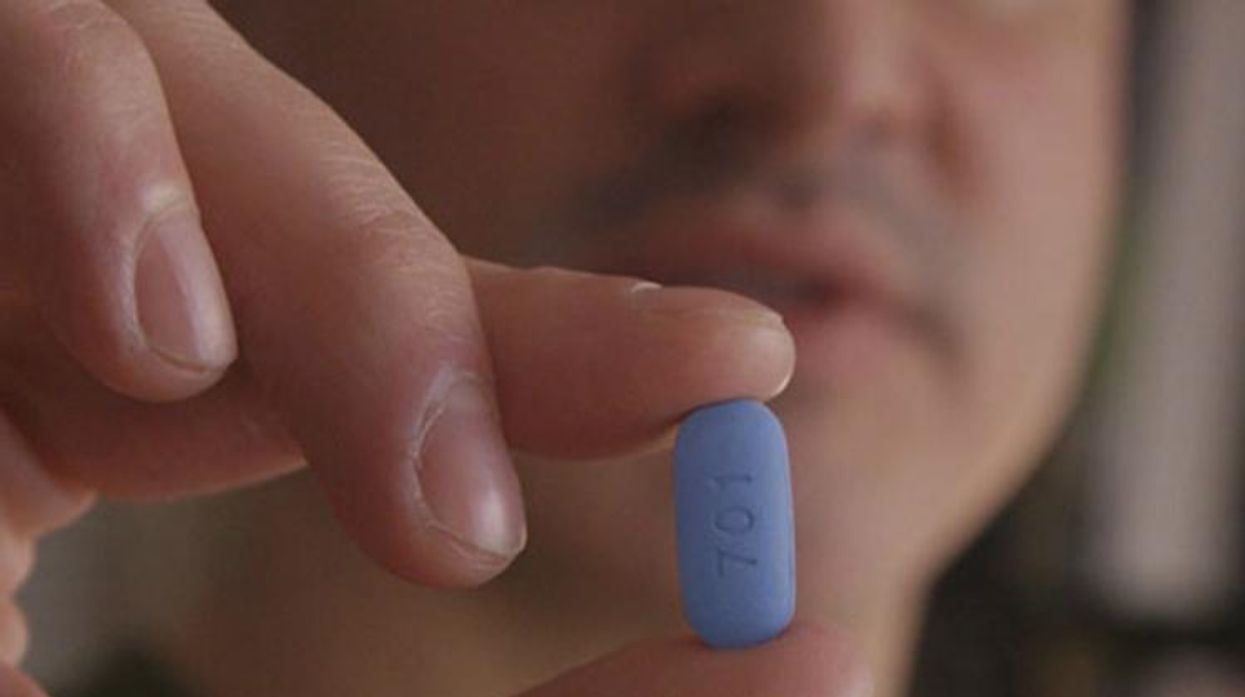It's a tough tightrope to navigate: Translating internal community politics for a broader audience, capturing all the contextual and historical nuances, and the conflicting voices, while making it easily digestible. That's the challenge faced in VICE's newly released three-part video series, Stopping HIV with the Truvada Revolution. In many ways, it's reflective of Truvada itself: A little blue pill consumed daily that contains not only Tenofovir and Emtricitabine, but a generation's worth of fear and PTSD, coated in the promise of a new age of sexual freedom.
You probably already know that Truvada is an antiviral drug that has traditionally been used to treat HIV, and is now also FDA-approved for pre-exposure prophylaxis (PrEP) to prevent it. You're also likely aware of the controversy surrounding efforts to make its usage widespread in the gay community. For some it's a godsend, for others, a false messiah. If none of this is news to you, VICE's report is not likely to deepen your understanding in a significant way.
But VICE is not a media outlet exclusively aimed at the LGBT community. It's a news organization with a growing international audience who may need to learn the basics on Truvada. The question is: How are the basics presented? In a piece that purports to offer a nuanced perspective, the series' title is perplexingly conclusive -- the drug is elevated to revolutionary status, and poised to singlehandedly end the era of AIDS. VICE has a reputation for adventurous and probing journalism, but here its treatment of Truvada feels devoid of its usually critical stance.
Title aside, most of the subjects interviewed in the series are disproportionately in favor of widespread Truvada usage. Dr. Robert Grant, of the Gladstone Institute, a leading research center on the drug, gives important medical background information. But Damon L. Jacobs, identified only as a Truvada advocate, receives as much or more screen time over the three short episodes (the longest is 11 minutes). Jacobs praises the freedom that the pill affords: "I feel like I've spent enough of my life losing sleep over the consequences of sexual behavior," he says, and sets about to convince others in the community. Reiterating Jacobs' points are Eric Paul Leue, the director of sexual health and advocacy of Kink.com (shown with a "Mr. Leather L.A. 2014" sash and a collection of sex toys in the background), and Michael and Leo, a couple who are able to engage in unprotected anal sex thanks to Truvada, despite Michael being an HIV carrier.
We have to wait until Part II of the series to see VICE raise the issue of access. Kimberleigh J. Smith, of Harlem United (a community AIDS services center) and a member of Governor Cuomo's Ending the Epidemic task force, stresses that minorites are less likely to obtain the drug. "Black and brown communities lack the access that our white counterparts have to healthcare," she says. "PrEP is more than just the pill -- it's the cost of care and the cost of lab work, testing, visits, that has to be accounted for."
Other doctors also briefly argue that Truvada is primarily being used by privileged white men, but Jacobs dismisses the argument, saying "I haven't seen that as the case. Now I'm not saying it may not be true." This is the point in the story where VICE is supposed to step in to confirm or challenge that claim, and shine a spotlight on a community not being served. But the question goes largely unanswered, and, as if to illustrate the point, the series features primarily white men as speakers. One exception, along with Smith, is Lorena Borjas, a Latina trans activist, who discusses the difficulty of receiving healthcare in Spanish, but that's the only time the challenges of bringing Truvada to at-risk communities are explored.
Michael Weinstein, the president of AIDS Healthcare Foundation, is the primary voice of dissent in the series. He questions whether the drug has earned the faith placed on it, and whether there are unconsidered implications of its widespread adoption; namely its potential role in exacerbating the spread of other sexually transmitted infections. Strangely, members of the community who have chosen not to take the drug (and there are many) are not there to counterbalance Jacobs', Michael', and Leo's cheerleading.
There's also little consideration for the long-term implications of taking Truvada: What does it mean for an individual to voluntarily commit, financially and medically, to a preventative drug for indeterminate years? What would it mean for us as a community to be largely medicated and entrust our collective health to a miracle pill? Several times VICE's series, Truvada is praised for taking the fear out of sex. Of course, several people point out, we have long had condoms at our disposal. The question VICE uncharacteristically fails to raise is whether the barrier to a community's sense of freedom is really as thin as a layer of latex.
The series' peculiar pacing allows us to watch Jacobs eat cereals, and Michael teach Leo about fried eggs, the type of domestic scenes appropriate for a one-hour documentary, but that seem time-sucking when you only have 25 minutes to tackle a complex modern medical dilemma. The soundtrack of piano tinkling, moaning cellos, and angelic voices imbues the film with unearned drama, like we're taken on some emotional journey, which it is not.
There are many missing perspectives, such as how Truvada can affect AIDS globally, and what additional research into vaccines and other treatments are closing in on eradicating AIDS. The series doesn't even mention alternative medical breakthroughs, presenting Truvada as the only solution.
What this series, and many conversations about Truvada fail to grasp or properly dissect, is that the internal communal debate is not so much a medical dispute as a philosophical and spiritual one. The science supports the pill's efficacy, at least for now. What we're really talking about when we argue over Truvada, or struggle to decide what we think of it, is its impact on the social fabric of our community: How do we bridge our painful past with a hopeful future? How does a generation still in mourning interact with a generation free from survivor's guilt? How do we learn to trust again, and how do we intentionally honor those we lost while remembering the lessons learned?
That's a lot of communal baggage to swallow in a little blue pill, but the conversation about Truvada must include it, or we may find a cure without ever truly healing.
WATCH PART 1
WATCH PART 2
WATCH PART 3






























